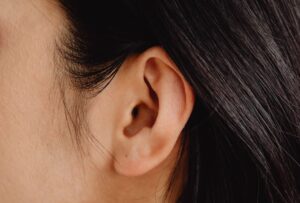That persistent ringing, buzzing, or hissing sound that seems to echo only in your ears can be a perplexing and frustrating experience. It might feel like a constant distraction, making it difficult to focus on conversations, enjoy music, or even find peace in silence. You may find yourself straining to hear amidst the incessant noise, leading to fatigue and even anxiety.
This phantom noise, known as tinnitus, is more common than you might think, and understanding its causes is the first step towards finding relief and reclaiming your auditory peace. Let’s delve into the world of tinnitus, exploring its types, causes, and the potential link with hearing loss.
What Is Tinnitus?
Often described as a “ringing in the ears,” tinnitus is the perception of sound when no external sound is present. It can manifest as a ringing, buzzing, hissing, clicking, whistling, or even roaring sound. The perceived sound can vary in pitch and loudness, and it may be present in one or both ears. For some, it’s a minor annoyance, while for others, it can significantly impact their daily lives.
Types of Tinnitus
While tinnitus itself isn’t a disease, it’s often a symptom of an underlying condition. Broadly, tinnitus is categorized into two main types:
Subjective
This is the most prevalent type of tinnitus, experienced only by the individual. It’s often described as a phantom noise that no one else can hear. Subjective tinnitus typically arises from damage to the inner ear, the auditory nerve, or the auditory pathways in the brain. This damage can disrupt the normal processing of sound signals, leading to the perception of phantom noises like constant ringing, buzzing, or hissing.
Objective
Objective tinnitus is a much rarer form that can be heard by both the individual experiencing it and an examiner using a stethoscope. This type of tinnitus is usually caused by actual sounds produced within the body, such as blood flow in the vessels near the ear (pulsatile tinnitus), muscle contractions in the middle ear, or problems with the temporomandibular joint (TMJ). In some cases, objective tinnitus can be resolved by treating the underlying medical condition causing the internal sounds.
Tinnitus Symptoms
The primary symptom of tinnitus is the perception of a phantom sound in one or both ears. This sound can manifest in various forms and intensities, depending on the underlying cause and individual factors.
- Ringing: This is the most common description, often characterized as a high-pitched tone.
- Buzzing: A lower-pitched sound, often described as a humming or vibrating sensation.
- Hissing: A whooshing or hissing sound, similar to static noise.
- Clicking: A rhythmic clicking or tapping sound, sometimes synchronized with the heartbeat.
- Whistling: A high-pitched whistling or chirping sound.
- Roaring: A loud roaring or rushing sound, often associated with pulsatile tinnitus.
These phantom sounds can be constant or intermittent, and their intensity can fluctuate throughout the day or in different environments. It’s important to catch these symptoms early so that you can seek professional help and explore potential management strategies.
Tinnitus Causes
The underlying causes of tinnitus are diverse, ranging from ear-related issues to systemic conditions and even certain medications. Identifying the specific cause is crucial for effective management and treatment. Discover what are some of the most common causes below:
- Hearing Loss: Age-related hearing loss is one of the most common causes of tinnitus. The beeping sound in the ear can be a result of damage to the hair cells in the inner ear.
- Noise Exposure: Exposure to loud noises, whether from occupational sources or recreational activities, can lead to noise-induced hearing loss and tinnitus.
- Earwax Buildup: Excessive earwax can block the ear canal, leading to temporary hearing loss and tinnitus.
- Ear Infections: Inflammation or infection in the middle ear (otitis media) can cause tinnitus. This is especially common among children, which is why prompt diagnosis and treatment are crucial.
- Ototoxic Medications: Certain medications, including some antibiotics, aspirin and chemotherapy drugs, can have ototoxic effects, damaging the inner ear and causing tinnitus.
- Temporomandibular Joint (TMJ) Disorders: Problems with the jaw joint can sometimes cause tinnitus.
- Other Medical Conditions: Tinnitus can also be associated with conditions like high blood pressure, diabetes, thyroid problems and head injuries.
If you’re experiencing a persistent ringing in your ears, it’s essential to head to a hearing health center to determine the underlying cause and receive appropriate treatment.
Relationship Between Tinnitus and Hearing Loss
Tinnitus and hearing loss often go hand in hand. In fact, hearing loss is one of the most common causes of tinnitus. Within the inner ear, delicate hair cells play a crucial role in translating sound vibrations into electrical signals that the brain interprets as sound. When these hair cells are damaged or destroyed, they can begin to send abnormal electrical signals to the brain. These erratic signals are often perceived as the phantom noises characteristic of tinnitus.
This explains why individuals with age-related hearing loss, noise-induced hearing loss, or other ear conditions are more likely to experience tinnitus. The hearing loss itself doesn’t directly cause tinnitus, but the underlying damage to the auditory system can trigger those phantom sounds.
Furthermore, the presence of tinnitus can exacerbate the challenges of hearing loss. The constant ringing or buzzing can mask external sounds, making it even harder to understand speech and navigate daily auditory experiences. This interplay between tinnitus and hearing loss highlights the importance of addressing both conditions for comprehensive auditory health.

When Should I be Concerned About Ringing in My Ears?
While occasional ringing in the ears can be a normal phenomenon, experiencing persistent or bothersome tinnitus warrants attention. It’s crucial to recognize the signs that indicate a need for professional evaluation. But how long does tinnitus last? And when does it become a cause for concern?
Here are some red flags to watch out for:
- Persistent Tinnitus: If the ringing, buzzing, or other phantom noises persist for more than a few days or become a constant presence, it’s essential to seek medical advice.
- Tinnitus in One Ear: While tinnitus can occur in both ears, persistent tinnitus in only one ear warrants prompt evaluation, as it could indicate an underlying condition specific to that ear.
- Pulsatile Tinnitus: If you perceive a rhythmic whooshing or pulsing sound in sync with your heartbeat, it’s crucial to seek medical attention, as this could indicate a vascular issue.
- Associated Symptoms: If tinnitus is accompanied by other symptoms such as hearing loss, dizziness, balance problems, or ear pain, it’s important to consult a healthcare professional.
- Impact on Daily Life: When tinnitus significantly disrupts your sleep, concentration, or overall quality of life, seeking professional help is crucial.
Silencing the Phantom Noise: Finding Relief from Tinnitus
While tinnitus may not always have a cure, there are various management strategies that can help reduce its impact on your life. These strategies often focus on addressing the underlying causes, reducing the perceived intensity of the tinnitus, and developing coping mechanisms to manage its presence.
If you’re troubled by a beeping sound in your ear or other phantom noises, seeking professional help is crucial. Not only could they identify potential underlying causes through an tinnitus matching test, but they can also recommend strategies on how to get your ears to manage ringing. With the right support and management strategies, you can reclaim your auditory peace and live a fulfilling life, even with tinnitus.








